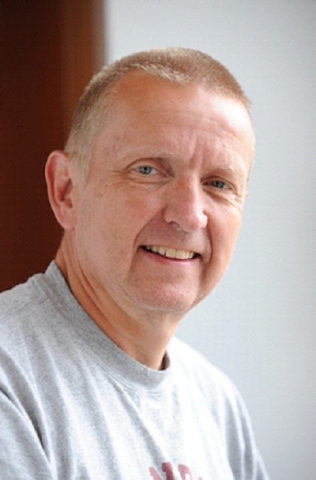
Students and staff at the University of Dundee will be encouraged to embrace their entrepreneurial spirit to develop the healthcare of tomorrow.
Kenny Fraser will share three decades of experience in the business world with Dundee’s School of Medicine having been named as a Royal Society Entrepreneur in Residence (EiR). He will utilise the School’s research base to highlight how the emerging field of human data science can be developed for commercial purposes.
Kenny is CEO of Triscribe, which uses prescription data to help hospital staff optimise medicine usage to improve patient outcomes. As part of the EiR scheme he will work across the School, encouraging and mentoring students and staff to exploit their research to improve the health of patients.
Dr David McBeth, Director of Research and Innovation Services at Dundee, said, “Hosting a Royal Society Entrepreneur in Residence is a huge honour.
“Human data science is a rapidly expanding area and the University has the capability to benefit from its vast commercial potential. Kenny’s experience will help staff and students tap into these opportunities.
“The University is already at the heart of the Tay Cities Deal, which will harness our excellence in science and research to create jobs and drive economic and health benefits across the region. Kenny’s appointment will further enhance the University’s reputation as a centre for innovation and entrepreneurship within these fields.”
Human data science is an emerging discipline that relies on precision data and is commercially relevant to traditional healthcare markets such as medical technology, drug development, and diagnostics. Over time, patients create thousands of data points throughout their life that help identify changes in their health but also enable tracking of similar patient cohorts across regions and geographies.
Dundee’s School of Medicine has an untapped wealth of knowledge and experience in human data science, which has the potential to revolutionise the healthcare market. Its staff also possess expertise across several key areas relevant to the direction of the healthcare market, including health data science, informatics and medical technology.
"Dundee has a world-leading medical school generating ideas that can make a real difference to the future health of billions of people,” said Kenny.
“I am excited to be taking on the EiR role which will act as a catalyst to translate some of these ideas into new commercial businesses, bring economic benefits and jobs while using the latest technology for good."
Entrepreneurship and innovation are at the heart of the University’s activities. It is a major contributor to the local and national economy and is leading two major projects within the Tay Cities Deal. These will bring a combined £40 million in funding to Dundee from the UK and Scottish Governments. The ‘Growing the Tay Cities Biomedical Cluster’ project builds on Dundee’s world-class expertise in life sciences, drug discovery and medical technology while ‘JustTech’ will leverage the University’s reputation in forensic science research to create new commercial opportunities for the region.
Independent economic assessment of the impact of the Growing the Tay Cities Biomedical Cluster project alone is for 280 new biomedical jobs by 2033, rising to 800 new jobs and over £190 million benefit to the local economy by 2053.